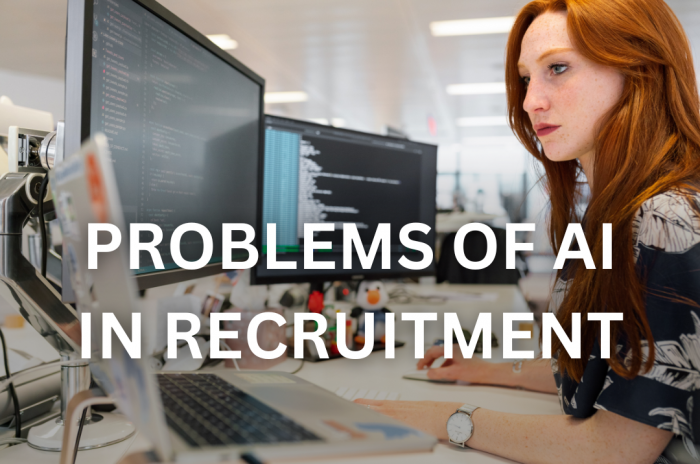Problems of AI in Recruitment

Is AI another “new normal”? Over the past few months, we have become exposed to the immense potential Artificial Intelligence offers. Two years ago, you probably would have never imagined that AI could, one day, help you sound like Barrack Obama or Taylor Swift.
However, AI use has been around for a while, and recruiters have used it for almost ten years. Still growing in popularity, a 2021 Forbes article revealed that 99% of Fortune 500 companies employ AI in some form while hiring. A 2023 Tidio study also shows that 65% of all recruiters use AI in their process.
Naturally, some valid concerns still exist with the use of AI in hiring. However, at the risk of sounding a bit cliche, the truth is that it can only get better from here. Furthermore, the benefits that the implementation of AI offers to your recruitment process are enormous.
We do not claim that recruiting AI is perfect, but it is rapidly improving. Solutions are beginning to emerge to tackle the problems we currently know of. Let’s take a look at some of them.
Tackling the Problems of AI in Recruitment
One of the biggest problems discovered with the application of AI in recruitment is bias. You’ve probably heard about the Amazon story when they found their recruiting AI was biased against women. Of course, this was not a conscious bias, but it mostly never is. Discrimination is also not always gender-based. Recruiting AI could unconsciously learn to discriminate based on race or age.
So far, the good thing is that we now realise that this is a problem. It arises because most recruiting AI is trained on the datasets of previous hiring patterns and preferences at organisations. But unlike human recruiters, AI’s impersonality means it does not understand the need for affirmative action to correct years of bias in an organisation. So, once it is trained on resumes or behaviours that biased recruiters previously used to make hiring decisions, it tends to continue that pattern.
Many service providers now carry out periodical algorithmic audits to solve the bias associated with recruiting AI to ensure a transparent process with objective metrics for candidate selection. Policymakers have also attempted to regulate how AI is being used to recruit in New York. Although the New York legislation has faced criticism for the loopholes it contains, it is still a step in the right direction.
We expect similar legislation in the European Union later this year or early next year. When it comes into force, the EU law will require companies that employ AI in their hiring to be more transparent about their use of AI and the factors that affect the AI’s decision-making. The transparency in processes that this law will bring about will make it easier to identify bias while also tackling the “black-box” scepticism surrounding AI use in business.
The JobGo Approach
With our understanding of the problems with recruiting AI, how do we at JobGo, give you a service that prioritises objectivity, helping you source and recruit the most qualified candidates? Simple, we combine the best of both worlds.
AI is undoubtedly useful for several aspects of recruiting, like searching for candidates, filtering applications, communication, etc. However, when combined with efficient human oversight and a human-led approach for other aspects like interviews, you end up with a fast and efficient system that only hires the most qualified candidates for a role.
So, do you need a service that gives you efficient tools with human expertise? Contact us today.
